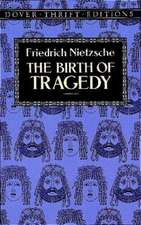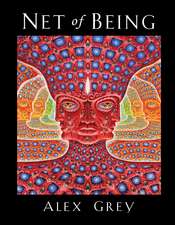Beyond Good and Evil
Autor Friedrich Nietzscheen Limba Engleză Hardback – 5 feb 2009
Preț: 190.75 lei
Nou
Puncte Express: 286
Preț estimativ în valută:
36.50€ • 38.21$ • 30.20£
36.50€ • 38.21$ • 30.20£
Carte tipărită la comandă
Livrare economică 01-07 aprilie
Preluare comenzi: 021 569.72.76
Specificații
ISBN-13: 9781595475558
ISBN-10: 1595475559
Pagini: 148
Dimensiuni: 152 x 229 x 13 mm
Greutate: 0.39 kg
Editura: NuVision Publications
Locul publicării:United States
ISBN-10: 1595475559
Pagini: 148
Dimensiuni: 152 x 229 x 13 mm
Greutate: 0.39 kg
Editura: NuVision Publications
Locul publicării:United States
Descriere
Descriere de la o altă ediție sau format:
`What is done out of love always takes place beyond good and evil.' Always provocative, the Friedrich Nietzsche of Beyond Good and Evil (1886) is at once sceptical psychologist and philosopher-seer, passionately unmasking European society with his piercing insights and uncanny prescience. This masterpiece of his maturity considers quintessential Nietzschean topics such as the origins and nature of Judeo-Christian morality; the end of philosophical dogmatism and beginning of perspectivism; the questionable virtues of science and scholarship; liberal democracy, nationalism, and women's emancipation. Written in his most masterful style, full of irreverence and brio, Nietzsche dissects self-deluding human behaviour, bankrupt intellectual traditions, and the symptoms of social decadence, while at the same time advancing an extra-moral wisdom to be shared by those kindred soul who think 'beyond good and evil'. This new translation of Beyond Good and Evil provides readers with a true classic of modernity that sums up those forces and counterforces in nineteenth-century Western Civilisation that to an astonishing degree have also determined and continue to inform the course of our own century. ABOUT THE SERIES: For over 100 years Oxford World's Classics has made available the widest range of literature from around the globe. Each affordable volume reflects Oxford's commitment to scholarship, providing the most accurate text plus a wealth of other valuable features, including expert introductions by leading authorities, helpful notes to clarify the text, up-to-date bibliographies for further study, and much more.
`What is done out of love always takes place beyond good and evil.' Always provocative, the Friedrich Nietzsche of Beyond Good and Evil (1886) is at once sceptical psychologist and philosopher-seer, passionately unmasking European society with his piercing insights and uncanny prescience. This masterpiece of his maturity considers quintessential Nietzschean topics such as the origins and nature of Judeo-Christian morality; the end of philosophical dogmatism and beginning of perspectivism; the questionable virtues of science and scholarship; liberal democracy, nationalism, and women's emancipation. Written in his most masterful style, full of irreverence and brio, Nietzsche dissects self-deluding human behaviour, bankrupt intellectual traditions, and the symptoms of social decadence, while at the same time advancing an extra-moral wisdom to be shared by those kindred soul who think 'beyond good and evil'. This new translation of Beyond Good and Evil provides readers with a true classic of modernity that sums up those forces and counterforces in nineteenth-century Western Civilisation that to an astonishing degree have also determined and continue to inform the course of our own century. ABOUT THE SERIES: For over 100 years Oxford World's Classics has made available the widest range of literature from around the globe. Each affordable volume reflects Oxford's commitment to scholarship, providing the most accurate text plus a wealth of other valuable features, including expert introductions by leading authorities, helpful notes to clarify the text, up-to-date bibliographies for further study, and much more.
Notă biografică
Friedrich Wilhelm Nietzsche (15 October 1844 - 25 August 1900) was a German philosopher, cultural critic, composer, poet, philologist, and scholar of Latin and Greek whose work has exerted a profound influence on modern intellectual history. He began his career as a classical philologist before turning to philosophy. He became the youngest ever to hold the Chair of Classical Philology at the University of Basel in 1869 at the age of 24. Nietzsche resigned in 1879 due to health problems that plagued him most of his life; he completed much of his core writing in the following decade.] In 1889, at age 44, he suffered a collapse and afterward a complete loss of his mental faculties. He lived his remaining years in the care of his mother until her death in 1897 and then with his sister Elisabeth Förster-Nietzsche. Nietzsche died in 1900. Nietzsche's writing spans philosophical polemics, poetry, cultural criticism, and fiction while displaying a fondness for aphorism and irony. Prominent elements of his philosophy include his radical critique of truth in favor of perspectivism; his genealogical critique of religion and Christian morality and his related theory of master-slave morality; his aesthetic affirmation of existence in response to the "death of God" and the profound crisis of nihilism; his notion of the Apollonian and Dionysian; and his characterization of the human subject as the expression of competing wills, collectively understood as the will to power.[26] He also developed influential concepts such as the Übermensch and the doctrine of eternal return. In his later work, he became increasingly preoccupied with the creative powers of the individual to overcome social, cultural and moral contexts in pursuit of new values and aesthetic health.[19] His body of work touched a wide range of topics, including art, philology, history, religion, tragedy, culture, and science, and drew early inspiration from figures such as philosopher Arthur Schopenhauer,[5] composer Richard Wagner,[5] and writer Johann Wolfgang von Goethe.[5] After his death, his sister Elisabeth became the curator and editor of Nietzsche's manuscripts, reworking his unpublished writings to fit her own German nationalist ideology while often contradicting or obfuscating Nietzsche's stated opinions, which were explicitly opposed to antisemitism and nationalism. Through her published editions, Nietzsche's work became associated with fascism and Nazism;[29] 20th century scholars contested this interpretation of his work and corrected editions of his writings were soon made available. Nietzsche's thought enjoyed renewed popularity in the 1960s and his ideas have since had a profound impact on 20th and early-21st century thinkers across philosophy-especially in schools of continental philosophy such as existentialism, postmodernism and post-structuralism-as well as art, literature, psychology, politics and popular culture
Cuprins
Beyond Good and Evil Introduction
Further Reading
Translator's Note
Further Reading
Translator's Note
BEYOND GOOD AND EVIL
Preface
Part One: On the Prejudices of Philosophers
Part Two: The Free Spirit
Part Three: The Religious Nature
Part Four: Maxims and Interludes
Part Five: On the Natural History of Morals
Part Six: We Scholars
Part Seven: Our Virtues
Part Eight: People and Fatherlands
Part Nine: What Is Noble?
From High Mountains: Epode
Commentary
Chronology



























